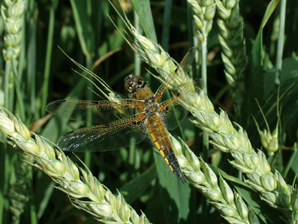|
In its full perspective organic farming provides answers to many of the intentions in the environmental and agricultural policies of Europe. Most obviously in terms of reducing environmental pressure, supporting ecosystem functions, and improving food safety, food quality and animal welfare.
Moreover, as the organic production is often smaller, but more valuable and labour intensive, organic farming also provides a potential in terms of supporting rural development, in sustaining farm income, in internalising public goods produced by agriculture in the marked and supporting decreased resource use in primary production (multifunctional agriculture), as well as in terms of reducing surpluses of agricultural commodities.
 |
The European Council has on several occasions recognised that organic agriculture improves the sustainability of farming activities and thus contributes to the general aims of the Common Agricultural Policy.
New initiatives setting out the Community policy for organic farming to develop the market for organic food and improve standards by increasing their efficacy, transparency and consumer confidence are presented in the Commission's European Action Plan for Organic Food and Farming.
|
The need for joining resources
In order to make full use of the potentials in organic farming a comprehensive research effort is necessary. And for the above reasons, research in organic food and farming is a rapidly expanding discipline on the European research scene.
One of the problems faced by authorities wanting to initiate research programmes in organic food and farming is that the present research effort in Europe is characterised by small research communities; often scattered and fragmented both geographically and institutionally. There is therefore a need for gathering the dispersed expertise to a critical mass in order to increase the competitive quality and relevance of the research.
In this connection increased collaboration and coordination is essential in strengthening the overall performance of European research in organic farming. Among others, it is important to establish networks and it is important to utilise possibilities for cooperation between national research programmes. Collaboration in education and extension as well as participatory or farmer-driven research should also be possible. Furthermore, identification of common evaluation procedures that are relevant to organic farming is seen as crucial for safeguarding and enhancement of research quality.
Creation of a European research area
The need for further cooperation and coordination across the borders are a characteristic for many research fields. The European Community is therefore supporting the creation of a "European Research Area".
The scheme initiated by the Community is intended to improve the coherence and coordination of European research programmes, and enabling national systems to take on tasks collectively that they would not have been able to tackle independently. This is done by supporting programme coordination and joint activities conducted at national or regional level, as well as among European organisations, and thus help to develop the common knowledge base necessary for the coherent development of policies.
Objectives of CORE Organic
One of the initiatives within the ERA-Net scheme is CORE Organic, which is a three-year Coordination Action in organic food and farming.
CORE Organic is an acronym for "Coordination of European Transnational Research in Organic Food and Farming" and the intention is to step up cooperation between national research activities in the area.
The overall objective of the project is thus is to enhance quality, relevance and utilisation of resources in European research in organic food and farming and to establish a joint pool of at least 3 million € per year for Transnational research in organic food and farming by the end of the project. And by gathering a critical mass and establishing a coordinating centre the specific objectives are:
- Increased exchange of information and establishment of a common open web based archive
- Coordination of existing research and integration of knowledge
- Sharing and developing best practice for evaluating organic research
- Identification and coordination of future research
11 partners but room for more
As the objective of the ERA-NET scheme is to improve cooperation between national research programmes, the entry condition for joining CORE Organic has obviously been a national research programme in organic food and farming.
When the project was initiated 11 countries (se current partnerlist) could be said to have such a programme. However, CORE Organic is open for new partners who have initiated national research programmes within organic food and farming.
In this connection, it is important to note that CORE Organic is not intended to finance research. On the contrary, partners are asked to put part of their budget into a joint research programme.
More information
Correspond to Claus Bo Andreasen |

